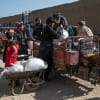Afghans return to Taliban rule as Pakistan moves to expel 1.7 million

As the clock ticked down to the Nov. 1 deadline Pakistan set for undocumented migrants to leave the country, Muhammad Rahim boarded a bus from Karachi to the Afghan border.
"We'd live here our whole life if they didn't send us back," said the 35-year-old Afghan national, who was born in Pakistan, married a Pakistani woman and raised his Pakistan-born children in the port city - but has no Pakistani identity documents.
The Taliban government in Afghanistan said some 60,000 Afghans returned between Sept 23 to Oct 22 from Pakistan, which announced on Oct 4 it will expel undocumented migrants that do not leave.
And recent daily returnee figures are three times higher than normal, Taliban refugee ministry spokesman Abdul Mutaleb Haqqani told Reuters on Oct 26.
Near Karachi's Sohrab Goth area - home to one of Pakistan's largest Afghan settlements - a bus service operator named Azizullah said he had laid on extra services to cope with the exodus. Nearby, lines formed before competitor bus services headed to Afghanistan.
"Before I used to run one bus a week, now we have four to five a week," said Azizullah, who - like all the Afghan migrants Reuters interviewed - spoke on condition that he be identified by only one name due to the sensitivity of the matter.
Reuters interviewed seven refugee families in Sohrab Goth, as well as four Taliban and Pakistani officials, community leaders, aid workers and advocates, who said Islamabad's threat - and a subsequent rise in state-backed harassment - has torn families apart and pushed even Afghans with valid papers to leave.
The Pakistani Interior Ministry did not immediately return a request for comment. Foreign Ministry spokesman Mumtaz Zahra Baloch said in a statement that the expulsion plan was compliant with international norms and principles: "Our record of the last forty years in hosting millions of our Afghan brothers and sisters speaks for itself."
Pakistan is home to over 4 million Afghan migrants and refugees, about 1.7 million of whom are undocumented, according to Islamabad. Afghans make up the largest portion of migrants - many came after the Taliban retook Afghanistan in 2021, but a large number have been present since the 1979 Soviet invasion.
The expulsion threat came after suicide bombings this year which the government - without providing evidence - said involved Afghans. Islamabad has also blamed them for smuggling and other militant attacks.
Cash-strapped Pakistan, navigating record inflation and a tough International Monetary Fund bailout program, also said undocumented migrants have drained its resources for decades.
Despite the challenges facing migrants, Pakistan is the only home many of them know and a sanctuary from the economic deprivation and extreme social conservatism that Afghanistan is grappling with, said Samar Abbas of the Sindh Human Rights Defenders Network, which is helping 200 Afghans seeking to remain.
RISE IN RETURNS
In early September, an average of 300 people crossed the border into Afghanistan daily, according to international organizations working on migration issues, who provided data on condition that they not be identified due to the sensitivity of the matter. After Islamabad announced the November deadline, crossings jumped to roughly 4,000, the organizations said.
These figures are small compared to the number of people to be affected in coming days. The information minister for Balochistan province, which borders Afghanistan, told Reuters it is opening three more border crossings.
For weeks, state-run television has run a countdown to Nov. 1 on the top of its screens.
Federal Interior Minister Sarfaraz Bugti warned that law enforcement agencies will start removing "illegal immigrants who have ... no justification" being in Pakistan after Tuesday.
They will be processed at "holding centers" and then deported, he told reporters, adding that women, children and the elderly would be treated "respectfully." Reuters could not determine how long they might be detained in the centers.
Pakistani citizens who help undocumented migrants obtain false identities or employment will face legal action, Bugti warned.
"Post-November will be very chaotic and there will be chaos in the Afghan refugee camps," said Abbas, the advocate.
FEAR AND DESPERATION
The U.N. refugee agency UNHCR and the International Organization for Migration (IOM) said Pakistan's plans create "serious protection risks" for women and girls forced to leave. Restrictions in Afghanistan, especially on female NGO workers, have led to shrinking employment opportunities for women there.
While Pakistan says it will not target Afghans with legal status, many with proper documents also find themselves being targeted, according to migrant advocates.
UNHCR data shows that 14,700 documented Afghans left Pakistan as of Oct. 18 2023, more than double the 6,039 in all of last year.
The agency said in a statement that 78 percent of recent returning Afghans it spoke to cited fear of arrest in Pakistan as reason for their departure.
There are more than 2.2 million Afghan migrants in Pakistan with some form of documentation recognized by the government that conveys temporary residence rights.
Roughly 1.4 million of them hold Proof of Registration (PoR) cards that expired on June 30, leaving them vulnerable. Islamabad says it will not take action against people with invalid cards, but Abbas told Reuters that police harassment has ramped up since the expulsion threat.
More than a dozen migrants that Reuters spoke to corroborated the claim, which was also repeated by Taliban diplomats in Pakistan.
Karachi East Police Superintendent Uzair Ahmed told Reuters that while there might be "one or two" instances of harassment, it was non-systemic and offenders would be investigated.
Many Afghans with legal status told Reuters they feel compelled to leave out of fear of being separated from family members without documentation.
Hajira, a 42-year-old widow in Sohrab Goth, told Reuters she has the right to remain in Pakistan, as do two of her four sons. The other two don't.
Fearing separation from her children, she plans on leaving with her sons and their families before the deadline expires.
Majida, a 31-year-old who was born in Pakistan, lives with her husband and their six children in an apartment complex in Sohrab Goth, a squalid suburb whose narrow streets are filled with heaps of garbage.
She said her family has PoR cards but has still been subject to harassment: a brother-in-law and nephew were detained by local authorities for several hours before being released. Reuters could not independently verify her account.
When Majida fell ill earlier in October, her husband refused to help her pick up medication at a nearby pharmacy out of fear of detention.
"We don't have a home or work (in Afghanistan)," she said. "Obviously, we think of Pakistan as our home, we've been living here for so long."
PRESSURE IN AFGHANISTAN
Back in Afghanistan, the influx of returning migrants and refugees has exerted pressure on already limited resources that are stretched by international sanctions on the banking sector and cuts in foreign aid after the Taliban takeover.
The Afghan Ministry of Refugees says it intends to register returnees and then house them in temporary camps. The Taliban administration said it will try to find returnees jobs.
The unemployment rate more than doubled from the period immediately before the Taliban takeover to June 2023, according to the World Bank. U.N. agencies say around two-thirds of the population is in need of humanitarian aid.
"We had our own barbecue shop and meat shop here. We had ... everything. We were guests here," said 18-year-old Muhammad just before he boarded Azizullah's bus back to Afghanistan.
"You should think of it this way: that the country is kicking out its guests."

 For all latest news, follow The Daily Star's Google News channel.
For all latest news, follow The Daily Star's Google News channel. 









Comments